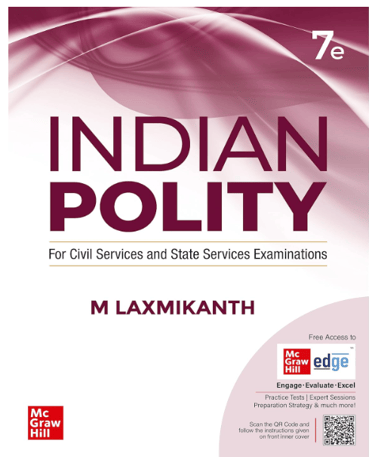Constitutional Morality: An In-Depth Exploration for UPSC and MPSC Aspirants
INDIAN POLITY
Constitutional morality is a concept that underscores the importance of the Constitution as the foundational framework of governance, guiding the actions of both the state and its citizens. It is the commitment to uphold the principles, values, and ethos enshrined in the Constitution, ensuring that power is exercised within its limits and in accordance with democratic principles. The notion of constitutional morality plays a critical role in interpreting constitutional provisions and is fundamental to the preservation of democratic governance, rule of law, and fundamental rights in India.
Understanding Constitutional Morality
Constitutional morality can be understood as a collective adherence to the values enshrined in the Constitution, which include justice, liberty, equality, and fraternity. It goes beyond mere legal adherence; it embodies the ethical obligations of institutions and individuals to act in ways that reflect the spirit of the Constitution. Constitutional morality requires respect for the rights of others and the understanding that governance should reflect the will and welfare of the people.
In a diverse country like India, where multiple cultures, languages, and religions coexist, constitutional morality becomes crucial in maintaining social harmony and ensuring that minority rights are respected. It encourages leaders and institutions to act not just within the confines of the law but also in a manner that is just, equitable, and promotes the common good.
Constitutional Morality in Practice
The concept of constitutional morality finds expression in various landmark judgments delivered by the Supreme Court and High Courts of India. These judgments have not only interpreted constitutional provisions but also set precedents that reflect the essence of constitutional morality.
1. Kesavananda Bharati v. State of Kerala (1973)
In this landmark case, the Supreme Court articulated the doctrine of the "basic structure" of the Constitution, establishing that while Parliament has the power to amend the Constitution, it cannot alter or destroy its basic structure. The judgment emphasized that constitutional morality is essential in maintaining the Constitution's integrity and protecting fundamental rights.
The Court stated, “The Constitution is a living document which is capable of growth and change, but it must be done within the framework of constitutional morality.” This case set the foundation for subsequent judgments that aimed to protect the fundamental principles of democracy, rule of law, and the separation of powers.
2. Maneka Gandhi v. Union of India (1978)
In this case, the Supreme Court expanded the interpretation of Article 21, which guarantees the right to life and personal liberty. The Court held that the right to life is not merely a right to existence but includes the right to live with dignity and freedom. This judgment reinforced the principle of constitutional morality by ensuring that any law or action infringing upon personal liberty must be just, fair, and reasonable.
The judgment highlighted that constitutional morality demands that laws must not only comply with the letter of the Constitution but also align with its spirit. The Court emphasized that the state must act within the bounds of constitutional morality while enacting laws or executing policies affecting individual rights.
3. Minerva Mills Ltd. v. Union of India (1980)
The Minerva Mills case reaffirmed the basic structure doctrine and emphasized the need for constitutional morality. The Supreme Court ruled that the Constitution must ensure that both the rights of the individual and the directive principles of state policy are given equal importance. The Court underscored that the harmony between fundamental rights and directive principles is essential for the effective functioning of democracy.
This case reinforced the idea that constitutional morality requires a balance between individual rights and the responsibilities of the state to achieve socio-economic justice.
4. Vishaka v. State of Rajasthan (1997)
In this case, the Supreme Court addressed the issue of sexual harassment at the workplace and established guidelines to prevent such incidents. The Court underscored the importance of gender equality and the need to uphold women’s rights as part of constitutional morality.
The Court stated that constitutional morality necessitates a commitment to gender justice and the protection of women’s dignity. The Vishaka judgment paved the way for the enactment of the Sexual Harassment of Women at Workplace (Prevention, Prohibition and Redressal) Act, 2013, reflecting a broader understanding of constitutional values.
5. Navtej Singh Johar v. Union of India (2018)
This landmark ruling decriminalized consensual homosexual acts by striking down Section 377 of the Indian Penal Code. The Supreme Court recognized that constitutional morality mandates respect for individual autonomy and dignity, which includes the right to love whomever one chooses.
The Court emphasized that the Constitution must reflect the values of a modern and progressive society. The judgment was a significant step towards promoting LGBTQ+ rights and showcased how constitutional morality evolves with changing societal norms.
6. Shayara Bano v. Union of India (2017)
In this case, the Supreme Court declared the practice of instant triple talaq unconstitutional, stating that it violated the rights of Muslim women and was arbitrary. The Court emphasized that constitutional morality must guide personal laws and that gender justice is a core tenet of the Constitution.
This judgment highlighted the necessity for all laws, including personal laws, to align with constitutional values, ensuring equality and justice for all citizens, irrespective of their religious affiliations.
The Role of the Judiciary in Upholding Constitutional Morality
The judiciary plays a crucial role in upholding constitutional morality by interpreting laws in a manner that reflects the Constitution’s values. The Supreme Court and High Courts have been instrumental in safeguarding the fundamental rights of citizens and ensuring that governmental actions comply with the principles of justice and equity.
Judicial activism has emerged as a mechanism through which courts address societal issues and protect the rights of marginalized communities. By interpreting constitutional provisions expansively, the judiciary has acted as a guardian of constitutional morality, ensuring that laws and policies reflect the aspirations of the people.
Challenges to Constitutional Morality
Despite the established framework of constitutional morality, several challenges persist:
1. Political Interference: The increasing politicization of institutions can undermine the autonomy of the judiciary and executive, compromising the adherence to constitutional morality.
2. Social Inequality: Deep-rooted social inequalities based on caste, religion, and gender continue to challenge the implementation of constitutional values, necessitating proactive measures to address these disparities.
3. Polarization and Majoritarianism: The rise of majoritarian politics can threaten the rights of minorities, highlighting the need for a robust commitment to constitutional morality to protect vulnerable groups.
4. Judicial Delays: The slow pace of justice delivery can erode public faith in the judiciary as a protector of constitutional values, making it imperative for the system to evolve and expedite processes.
Conclusion
Constitutional morality is a vital pillar of democratic governance in India, ensuring that the Constitution remains a living document that reflects the aspirations of the people. It necessitates a commitment from all state institutions and citizens to uphold the values enshrined in the Constitution.
The judiciary, through its interpretations and rulings, plays a pivotal role in safeguarding constitutional morality, ensuring that the rights and dignity of individuals are protected. However, challenges persist, requiring continuous efforts to reinforce the principles of justice, equality, and fraternity.
For UPSC and MPSC aspirants, understanding constitutional morality is crucial not only for examinations but also for fostering a deeper appreciation of the democratic ethos and the responsibilities that come with public service. Embracing constitutional morality is essential for building a just society that upholds the rights and dignity of all its citizens, ensuring that the ideals of the Constitution are not just theoretical but are actively lived and experienced.


